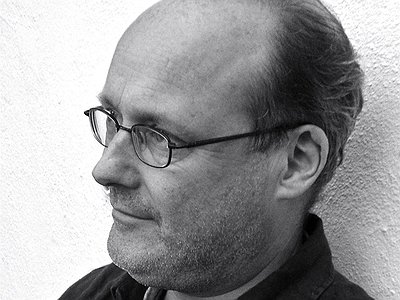What, to you, are the main functions and goals of soundtracks and film music and how would you rate their importance for the movie as a whole?
How the score functions, depends on the movie really - and see above. There's some wonderful film music around, and some film music can rescue the film. There’s the occasional great film that has no music. It's illuminating that a conceptualist like Lars Von Trier doesn't use music: it seems to me that music doesn't fit so well with more cerebral concepts.
Jerry Goldsmith once asserted that, as a composer, one "can't be visual with the music". How do you see the relationship between image and sound in a movie? How directly are you working with the images in the writing process?
One would think that if there are images on screen of, say, brutal combat, then there's no point in have clattering aggressive music, as that's already been dealt with in the action. Yet that's exactly what can happen due to possible nervousness about a scene's effectiveness. If a talent like Goldsmith is at one’s disposal, then it makes sense to use him in a role other than in reiterating content that should be conveyed by the script, the performances and the visual elements.
Elliot Goldenthal mentioned that while a movie is "going linearly from side to side", you have to talk about film music "vertically". What's your take on this statement?
Interesting…. I'd say that rather than thinking purely “vertically”, I feel the score is as much about depth.
There’s the stuff I’ve mentioned already: the emotional inner workings of the script and characters etc., but music and sound is in 3D. It has height - the frequency spectrum; it has width - stereo and surround; and it has depth - as in where it is in terms of space, which is determined by the ambience around each sound component. And although music exists in time, it’s independent of the chronology of the action – perhaps that’s what Goldenthal is getting at.
Scores can either exist entirely of original material or temp-track music. Are these two approaches equal or do you feel as though a soundtrack written especially for a movie is always to be preferred?
As an example, David Holmes' score for Ocean's Eleven powered a fluffy premise in a stylish and exciting way throughout the entire movie. No disrespect to that or any original score, but for oomph, an original score can't compete with a well-chosen "found" track. The use of Cream's Sunshine of your Love as we move into Robert De Niro in Goodfellas is very powerful. Found music brings some very potent cultural baggage; a score, however, is like a bespoke suit, in comparison to the flashiness of Pop tracks!
People tend to see film music as existing in a time of its own. Would you, on the other hand, say that there such a thing as zeitgeist in film music as well? Are there compositional devices, which you don't find appropriate or wouldn't use right now, because they're too closely associated with a particular era?
I don't think e.g. John Lurie's score for Down By Law would be terribly out of place in current cinema – it depends. I'd love to do a Jazz score, but I’ll have to wait for an appropriate situation.
The melodrama of the 50s is way over the top for today's audiences, and the music of the 60s and 70s is referenced knowingly now.
The balance between visuals, fx and film music is a delicate one. What, from your point of view, determines whether or not it is a successful one?
The music has to be loud enough to have an affect on the audience, while being able to work well with all the other cinematic elements. Today the divide between score and sound design is blurring, so it's important to forge a good, communicative relationship between the composer and sound designer. It's all about making the right decisions as a team for each moment of the film, as well as for its timeline.
In your opinion, should film music remain connected to the picture it was conceived for or should have it an intrinsic value outside of the movies?
It would be churlish to limit oneself to only listening to, say, Ennio Morricone, with the original visuals. Then again, an OST album of, say, Carter Burwell's very effective score for No Country For Old Men would make for a very short album. Depends then.
Usually, it is considered that it is the job of the movie to win over an audience. But watching and listening are also active, rather than just passive processes. How do you see the role of the spectator in the cinematic communication process?
I'm sure all filmmakers gauge every iota of the creative process by how it might involve the viewer. I think a movie has to be an exceptional world to immerse oneself in for ninety minutes or so, and there’s no forgetting that every viewer is a critic - I just love being part of the process, whether I’m part of the production, or munching on popcorn.
Please recommend two film music composers to our readers which you feel deserve their attention.
Lubos Fiser and Edwin Astley.


